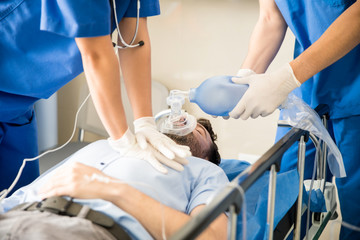
Common Medications Linked to Sudden Cardiac Arrest in People With Type 2 Diabetes
HAMBURG, Germany – Use of some antibiotic and antipsychotic drugs increases the risk of sudden cardiac arrest (SCA) among people with type 2 diabetes who do not have a history of cardiovascular disease (CVD), shows the first such analysis of real-world, primary care data.
People with type 2 diabetes who do not have a history of CVD have almost three times the risk of SCA if they take antipsychotic medications and nearly double the risk if they take certain antibiotics that prolong the QT interval, notably, macrolides and fluoroquinolones.
"These data show that commonly prescribed drugs ― antipsychotic medications, used by about 3% of people with type 2 diabetes, and antibiotics, taken by 5% to 10%, convey an increased risk of sudden cardiac arrest in those without a history of cardiovascular disease," said Peter Harms, MSc, who presented the study at the European Association for the Study of Diabetes (EASD) 2023 Annual Meeting. Another drug associated with an increase in SCA among patients with diabetes was domperidone, an antinausea medication.
"Perhaps these drugs could be avoided in some cases, and GPs should be more aware of the possible consequences of their use," he added. "If the patient has type 2 diabetes, then maybe it's better to avoid some of these medications and try and cope without them, or at least find an alternative antibiotic."
Harms, an epidemiologist from Amsterdam University Medical Centers, the Netherlands, highlighted that their study was unique because the investigators drew upon primary care data. "These data are extensive, and we find a lot of associations which are very real."
SCA is associated with 50% of all cardiac deaths and accounts for 20% of all mortality in high-income countries. Of those people who experience SCA, 80% of cases prove fatal.
"As the name suggests, it is difficult to predict because it is sudden, especially in people without a cardiovascular disease history," Harms pointed out in an interview with Medscape Medical News. He highlighted that "around half of those who experience SCA, often between the ages of 40 and 60 years, have never seen a cardiologist, but many do have type 2 diabetes.
"We need to better understand how to recognize people at risk of SCA, know who to watch and how to prevent these events," he emphasized.
Vladimira Fejfarova, MD, co-moderated the session and commented on the study. "From the clinical point of view, it's necessary to evaluate risk factors that can contribute to sudden cardiac arrest."
Overall, the researchers found that among people with type 2 diabetes who do not have a history of CVD, hypoglycemia, severe hypertension, dyslipidemia, and use of QTc-prolonging medications are associated with SCA risk. Among people with type 2 diabetes and CVD, albuminuria and heart failure are associated with SCA risk.
Fejfarova added: "With type 2 diabetes and also type 1, we need to look more at adverse events, especially when treating infections with macrolides, but also mycotic infections, because antimycotic drugs are known to influence QT intervals that could contribute to sudden cardiac arrest.
Original article from Medscape.
------------------------------------------------------------------------------------------------
Expand your knowledge on the topic of diabetes with our expansive list of diabetes-related continuing education courses:
- Diabetes: An Introduction
- Diabetes Medications
- Diabetes Medications: Part 2
- Diabetes: Metabolic Syndrome and Prediabetes
- Diabetes Overview: Type 1, Type 2, and Gestational Diabetes
- Diabetes Related Conditions and Complications
- Diabetes Management and Insulin Pumps
- Diabetes Management and Insulin Pumps for School Nurses
Pedagogy's courses are available for purchase by the individual or facility. For individuals, register with us to create your username and password, click on the course title of interest and then click the Purchase button. For a complete listing of all our online continuing education courses, including the largest selection of infusion continuing education courses offered online, click here!
For organizations that would like to purchase education for their entire staff, email sales@pedagogyeducation.com and let us know the course(s) of interest and how many staff members you need to provide education for, and we will be happy to send you a price quote.

